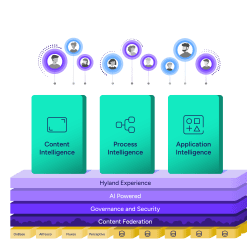Executive summary
- Unstructured data often remains trapped in silos or inconsistent formats, limiting efficiency, decision-making, and AI readiness.
- Hyland Knowledge Enrichment transforms unstructured data into actionable insights through tools like extraction, metadata tagging and named entity recognition, which ensures AI and automation-ready content.
- Improve data quality, decision-making and operational scalability with Knowledge Enrichment and equip data engineers with tools to improve data quality, enable app developers to accelerate development and enhance app functionality and empower solution builders to innovate and create holistic solutions.
Unstructured data is everywhere — emails, contracts, reports, customer interactions, scanned documents and more. Unlike structured data, which fits neatly into databases, unstructured content is highly variable, making it difficult to organize, analyze and integrate into business processes.
The sheer volume is staggering: 80% of enterprise data is unstructured, and it is spread across multiple systems — on average, 21 different repositories within an organization, according to a Hyland-commissioned Forrester study.
This fragmentation of critical content across repositories creates significant challenges, including:
- Inefficient access: Valuable information is trapped in silos, making it hard to find and use effectively.
- Inconsistent formats: Documents come in a wide range of file types and layouts, requiring extensive effort to normalize.
- Data quality issues: Duplicate, outdated or incomplete data hinders decision-making and automation.
- AI and automation barriers: AI models need structured, clean input to generate meaningful insights, yet most unstructured data is noisy and unprepared for AI consumption.
Despite these challenges, unstructured data holds enormous potential. When processed correctly, it becomes a goldmine of insights, fueling AI-driven decision-making, automation and solution building.
The key to unlocking the potential of unstructured data Knowledge Enrichment.
What is Hyland Knowledge Enrichment?
Knowledge Enrichment is Hyland’s API-driven solution that transforms raw, unstructured content into meaningful, structured data that is ready for use in AI, automation, analytics and solution-building. This involves extracting key entities, applying metadata, linking contextual information, and ensuring content is machine-readable and actionable from the outset.
Knowledge Enrichment consists of two key components:
- Data Curation is focused on structuring and normalizing unstructured data so it’s clean and usable. This process is powered by Hyland Document Filters, an inspection, extraction and transformation tool that enables the structuring of data from over 600 file formats while preserving the context of the original document.
- Context Enrichment enhances unstructured data by linking it with relevant contextual information, which improves searchability, AI processing and decision-making.
How does Knowledge Enrichment change how you work?
Instead of relying on multiple postprocessing steps to clean and structure data, Knowledge Enrichment embeds intelligence early in the workflow, ensuring content is optimized for downstream applications as soon as it is ingested.

How Knowledge Enrichment works: A semitechnical breakdown
The Knowledge Enrichment API is powered by a combination of robust technologies and automation capabilities that ensure high-quality structured data output:
Data curation with proven tools
Document Filters extracts, normalizes and structures content from over 600 file formats, ensuring clean and consistent data that is ready for downstream applications while maintaining the document’s logical structure. This allows organizations to seamlessly integrate data from diverse document types without losing its original meaning or intent.
Automated metadata tagging
Automated metadata tagging analyzes images to identify key elements, such as objects, scenes and text, then generates metadata to enhance searchability and AI model accuracy. This feature allows organizations to categorize and retrieve images more efficiently, improving content accessibility and relevance.
Data normalization and structuring
By converting unstructured text into standardized formats, Knowledge Enrichment makes content ready for machine learning, analytics and automation workflows. This process includes deduplication, format standardization and intelligent content segmentation.
Named entity recognition (NER)
NER technology identifies essential entities, such as people, organizations and locations from documents and assigns contextual meaning. This allows businesses to streamline categorization and automate intelligent workflows.
By automating these processes, Knowledge Enrichment:
- Reduces the reliance on manual data preparation
- Enhances data consistency
- Accelerates the time-to-insight for AI and analytics applications
Benefits of Knowledge Enrichment
From transforming unstructured content into actionable insights to enhancing AI performance and scalability, Knowledge Enrichment streamlines workflows and improves operational efficiency. Let’s explore the key benefits of the solution, including its impact on data quality, cost reduction and decision-making.
Makes unstructured data actionable
By enriching data at the point of ingestion, Knowledge Enrichment turns raw documents into structured, AI-ready content. This eliminates the need for costly and time-consuming preprocessing steps. Additionally, by improving how data is organized and indexed, Knowledge Enrichment enhances accessibility, which allows businesses to quickly locate relevant information and take timely action. This ensures critical insights are readily available and reduces delays in decision-making while improving operational efficiency.
Improves AI and analytics performance
Clean, structured data leads to:
- Improved AI predictions
- Better decision-making
- Faster processing times
Organizations can trust that their insights are based on high-quality input.
Reduces operational costs
By embedding enrichment within the content workflow, businesses reduce the burden of manual data processing. This frees up resources and improves efficiency across teams and workflows.
Enhances scalability
As organizations handle larger volumes of content, Knowledge Enrichment ensures they can process more data without added complexity, enabling seamless growth.
Improves data quality
High-quality data is the foundation of effective decision-making and AI-driven insights.
Knowledge Enrichment enhances data consistency, accuracy and completeness by structuring unstructured content, applying metadata and establishing meaningful relationships between disparate pieces of information. This ensures that organizations are working with the most reliable and relevant data possible, reducing errors and improving overall operational effectiveness.
Unfortunately, poor content hygiene, like obsolete, untrusted, or duplicate information, is a common challenge. Sixty-two percent are taking steps to enrich or improve their content, making it more suitable for content intelligence. However, 52% say most of their content is not AI-ready.
— The Rise of Content Intelligence: A New Era of Innovation in ECM, Forrester, 2025
Real-world applications of Knowledge Enrichment
From improving product discoverability to streamlining claims processing and structuring patient records, Knowledge Enrichment empowers organizations to deliver better outcomes and scale seamlessly. Let’s explore real-world applications that showcase the value of Knowledge Enrichment in solving complex data challenges.
Retail: Automate metadata generation
A major retail company needed a solution to automate metadata generation and identify named entities across product catalogs. Knowledge Enrichment applied consistent metadata tagging and created contextualized descriptions. This enabled more accurate data about the documents and more efficient natural language search, as well as improved recommendation engines.
With Knowledge Enrichment:
- Data Curation extracted and structured product details across various document formats.
- Context Enrichment identified key attributes such as brands, specifications and categories.
- Automated metadata tagging enhanced search accuracy and product discoverability.
These enhancements led to more reliable product data, improved search relevance and better personalization in recommendations.
21
Average number of enterprise content repositories
65%
Say unstructured data is a largely untapped opportunity at their organization
89%
Organizations not maximizing AI use for content intelligence
— The Rise of Content Intelligence: A New Era of Innovation in ECM, Forrester, 2025
Insurance: Enhance claims processing
Consider an insurance company that processes thousands of claims daily. Traditionally, these claims contain a mix of structured forms and unstructured supporting documents, such as medical reports and photographs. Without Knowledge Enrichment, processing these claims would require extensive manual intervention, unnecessary slow approvals and higher operational costs.
By implementing Knowledge Enrichment:
- Data Curation extracts and structures content from diverse file types while preserving document context (consider pieces of an insurance claim that might include photos, documents, emails, etc.).
- Context Enrichment identifies key entities such as claimants, medical providers and vehicle details, linking them with relevant policy and claims data.
- Image analysis detects key aspects of submitted images, such as vehicle make and model, extent of damage, and potential inconsistencies, aiding in fraud detection and claims validation.
Applying Knowledge Enrichment results in faster claims processing, reduced manual workload and improved accuracy in fraud detection.
Healthcare: Structure patient records for enhanced insights
Healthcare providers deal with vast amounts of unstructured patient data, including physician notes, medical histories, prescriptions and test results. Extracting meaningful information from these records manually is time-consuming and prone to errors.
By implementing Knowledge Enrichment:
- Context Enrichment extracts key details such as diagnoses, medications, allergies and test results from diverse medical documents.
- Data Curation structures patient data into standardized formats, ensuring interoperability across electronic health record (EHR) systems.
- Knowledge Enrichment enhances decision-making by making critical patient information readily available for AI-driven analytics, predictive modeling and clinical decision support.
By transforming unstructured patient records into structured, actionable data, healthcare providers can improve operational efficiency, support better patient outcomes, and streamline compliance with regulatory requirements.
Why Hyland and Knowledge Enrichment?
Hyland brings decades of expertise in document processing and content intelligence, making us uniquely positioned to deliver high-quality data curation and content enrichment solutions. Our approach ensures:
- Data is structured and AI-ready from the start.
- Workflows are streamlined and scalable for future growth.
- AI-driven insights are faster, more accurate and cost-effective.
- Document Filters provides unparalleled support for over 600 file formats, ensuring data curation works seamlessly across a broad range of document types while preserving context.
With Hyland Knowledge Enrichment, businesses gain a competitive edge — turning unstructured data into a strategic asset that fuels smarter decision-making and innovation.














